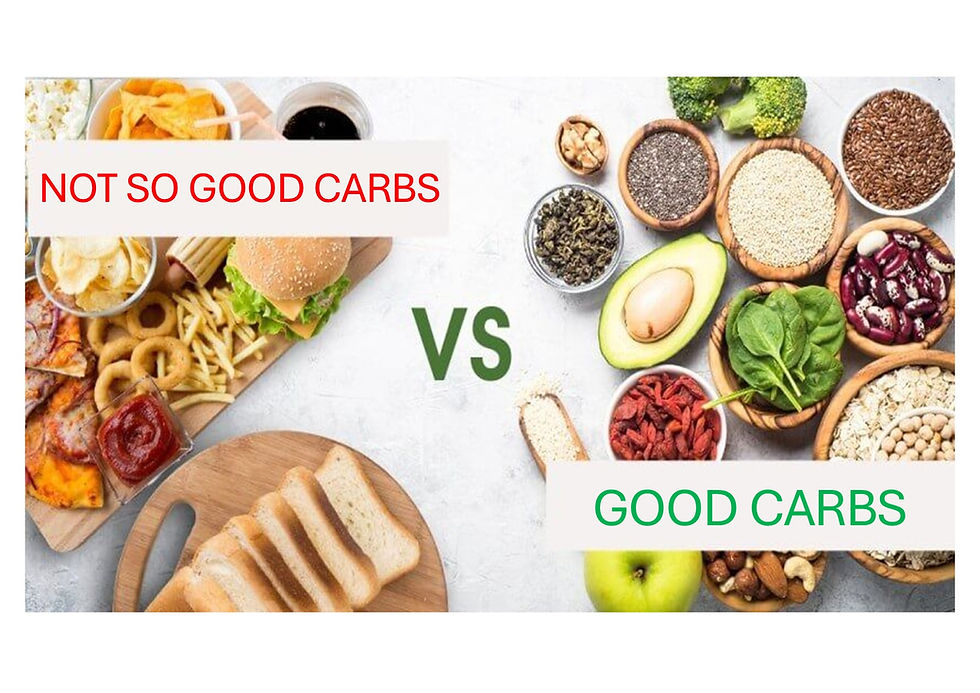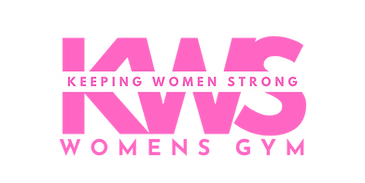Understanding the UPS and DOWNS of CARBS
- helenfkws
- Jul 28, 2025
- 3 min read
Updated: Aug 26, 2025

When it comes to fueling our bodies, carbohydrates are often the topic of confusion and debate. While we’re told we need energy to function, the truth is that not all carbs are created equal.
In fact, unlike essential fats, vitamins, and proteins, carbohydrates don’t have a specific “essential” category. That doesn’t mean carbs aren’t important, but the quality, amount eaten over a day and the source of those carbs matters far more than we often realize.
Let’s Break CARBS Down:
The GOOD Carbs
These are the carbohydrates that come from natural, whole foods—like vegetables, fruits, and legumes. These are packed with fibre, vitamins, and minerals, providing the energy we need without spiking blood sugar levels (the fibre slows the natural sugar down). These carbs give us sustainable energy while supporting digestion, regulating blood sugar, and fueling our brain for daily tasks and our muscles, heart and lungs for exercise.
NOTE: Even GOOD CARBS eaten in excess of our energy needs will lead to them being stored in fat cells as energy reserves. If you don't use it, you'll STORE IT!!!
The Marginally Better Carbs
Whole (unprocessed) grains are the next best option. While they are still carbs, they’re much more nutrient-dense than their refined counterparts. Think brown rice, quinoa, oats, and barley. These provide good fibre, B vitamins, and essential minerals. However, they still provide a higher glycemic index (the rate at which sugar enters your bloodstream) than vegetables, fruits and legumes.
NOTE: Marginally better CARBS eaten in excess of our energy needs will be quickly stored in fat cells as energy reserves. If you don't use it, you'll STORE IT!!!
The NOT-So-GOOD Carbs
On the flip side, we have processed carbs—those high-calorie, low-nutrient foods that many of us indulge in (manufactured taste, packet, bar code, artificial additives) from sugary and savoury snacks to refined breads, cereals, bickies, cakes and bars. These carbs are quickly converted into glucose (sugar) in the bloodstream.
These can lead to insulin spikes, energy crashes, and long-term health issues like weight gain, inflammation, cholesterol and heart issues, insulin resistance and diabetes.
NOTE: Consuming too many NOT-so-good Carbs beyond our energy requirements will rapidly store in fat cells as energy reserves. If you don’t use it, you’ll STORE IT, leading to cravings because your body lacks essential nutrition, struggles with bowel movements due to insufficient fibre, and has to contend with the inflammation and stress caused by the excess sugar!!!
The Bottom Line:
While carbs are a necessary source of energy, it's important to focus on the QUALITY and QUANTITY and TIMING of the Carbohydrates we eat.
Aim for the natural, nutrient-dense sources like vegetables, fruits, and legumes.
Limit your intake of processed carbs, sugars and refined grains. Remember, it’s not just about providing energy for the body—it’s about providing sustained energy that supports your health goals.
REMEMBER if you don't burn the Carbs through regular exercise and daily activity, it stores and stays as stubborn FAT.
FAT LOSS is much more difficult if Carbs are eaten at night!
By choosing the RIGHT GOOD CARBS in the RIGHT AMOUNT at the RIGHT TIME of the day, you’ll feel more energized, balanced, and in control of your weight and health.





Comments